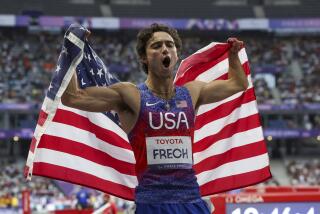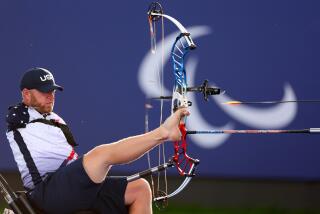Atlanta Plays Host to Physically Disabled Paralympians
- Share via
ATLANTA — World-class athletes. Visitors from the White House. Computer glitches. Sound familiar?
Less than two weeks after the Olympic caravan pulled out of town, competition began Friday--before considerably smaller crowds--for the 1996 Summer Paralympic Games. About 3,500 disabled athletes from 127 countries are competing in the same venues as the Olympians for 10 days in what organizers call the second-largest sporting event in the world.
“This is a singular, watershed event for the disabled,” said Barbara Trader, vice president of the Atlanta Paralympic Organizing Committee.
She said the Games, which are being televised for the first time in the United States, would be an opportunity for millions of Americans to be exposed to the achievements of elite disabled athletes.
This is the first time the 36-year-old Paralympic Games are being held entirely on U.S. soil. In 1984, when Los Angeles hosted the Olympics, the Paralympics were split up, with portions staged in New York and the rest in Britain.
At Thursday’s opening ceremonies, with actor Christopher Reeve as master of ceremonies, a capacity audience of 64,588 was entertained by the likes of Aretha Franklin, Carly Simon and Hall and Oates.
A number of speakers evoked the name of Atlanta’s most famous native son, the Rev. Martin Luther King Jr., as they appealed for what Atlanta Paralympic chief G. Andrew Fleming called “a level playing field” on which to compete in every arena of society with people without disabilities.
*
“Just as Dr. King taught us that the color of one’s skin should not determine one’s destiny, so too will these athletes teach us that one’s physical characteristics should not define or limit their life’s potential,” Flemming said.
Vice President Al Gore referred to King’s message of inclusion, opportunity, unity and respect and said, “Disability does not and must never disqualify” people from participating to the fullest in society.
Opening ceremonies were less elaborate and theatrical--and no doubt much less expensive--than the Olympic Games’ opening, but they were no slouch in the pageantry and drama departments.
Instead of chrome-plated pickup trucks and spectacularly costumed dancers, there were Army skydivers, the Golden Knights, who were led by Dana Bowman, a double-leg amputee.
And instead of Muhammad Ali emerging dramatically to light the Olympic flame, there was Mark Wellman, a mountain climber who lost a leg in 1982, pulling himself on a rope up the tower to the caldron while holding the lighted torch between his knees as a 5,000-voice gospel choir sang, “This little light of mine, I’m gonna let it shine.”
The Paralympics often are confused with the Special Olympics, an all-inclusive sporting event for the mentally handicapped. But Wellman’s feat should’ve been enough to get across the message that these are elite athletes performing at top form.
Many Paralympic records are in the general neighborhood of their Olympic counterparts.
Nigerian Ajibola Adoye, who is missing one arm, has run the men’s 100 meters in 10.72 seconds; Frank Fredericks set an Olympic and world record of 9.84 seconds during the Atlanta Olympics. Florence Griffith Joyner holds the Olympic record of 21.34 seconds for the women’s 200 meters; Marla Runyan, a visually impaired runner from the United States, set a Paralympic record of 25.31 seconds.
Still, although organizers say they expect 1.3 million people to attend the 10-event Games, some competitions Friday were sparsely attended.
Volleyball competitions have been separated into categories for wheelchair athletes and for those able to stand.
About 200 people showed up to watch the Israeli standing volleyball team get trounced by Germany in the first competition Friday, held in an auditorium that holds more than 9,000 people.
As the athletes played, diving, falling and spiking like volleyball players everywhere, it took a while to notice that they had disabilities. At least one player on each team was missing an arm; an Israeli player had one hand. Members of both teams had prosthetic legs.
This will be the last occasion that the Olympic and Paralympic Games will be separately planned.
The International Olympic Committee has decreed that, starting with the 1998 Winter Games in Nagano, Japan, all future Olympic bids must include a formal plan for financing and staging the Paralympic Games as well.
The 1996 Paralympic budget is $89.3 million. It cost organizers $1.7 billion to put on the 1996 Olympics.
CBS has set aside a few hours of Paralympic programming this weekend and next. In addition, regional cable network SportSouth will have nightly hourlong highlights shows. Also, CNN plans to run features about past and present Paralympic champions.
More to Read
Go beyond the scoreboard
Get the latest on L.A.'s teams in the daily Sports Report newsletter.
You may occasionally receive promotional content from the Los Angeles Times.






